“We’re live entertainers and we do improv [or improvised] theatre, which you obviously need to perform on a stage, in front of an audience—or so we thought,” says Mehra. “For a lot of us, theatre isn’t our primary source of income, but with shows a couple of times a week, it is additional revenue. But even besides that, we wanted to find ways to continue practising, putting out our acts. With the lockdown, we had to stop all rehearsals and workshops. But very quickly, we saw that a lot of the improv community around the world had gravitated towards doing things online.”
Mehra’s routine now involves logging in to video conference app Zoom to rehearse with his colleagues each night, a troupe called Improv Comedy Bangalore, of which he is the artistic director. “It works fairly similarly to as it would on stage,” he says. “There are differences, of course—you can’t feed off each other’s energies, take physical cues or use body language—but on Zoom, we’re focusing a lot more on facial expressions, vocal exercises and accents it’s a whole different genre, and it’s really exciting for us to challenge ourselves with it.”
That’s not all—the troupe is putting on its first show at the time of writing this piece. They’ve publicised it through social media and will have an online audience tune in to watch their live show. Particularly in improv, the audience plays a key role—suggesting situations, characters and storylines, challenging the comedians to stage fresh, on-the-spot acts. On Zoom, while only the comics will have their videos displayed, the audience will be able to engage over a chat, and a full-time moderator will pass on their suggestions to the cast. While there isn’t an applause feature, Zoom lets you ‘raise your hand’ during a call, which the comics will translate to claps. The show won’t be ticketed, but the audience can send in donations, which will go to NGO GiveIndia, currently raising money for those hit by Covid-19.
Mehra’s story is one of many Indians who have had to quickly adapt to make sure work—and business—continues even during the lockdown. With infection numbers steadily rising, social distancing threatens to extend into a short-term way of life, and companies are coming to terms with a remote working culture for the interim.
While the ‘work from home’ concept has been popularised by many Silicon Valley tech giants, it has yet to catch on in India as a regular feature, even in the more agile startup space. In its current form, the option to work remotely was largely being offered to gig workers it was unavailable to most full-time staff, unless the location demanded it. But India Inc had to change course almost overnight: The coronavirus infection was beginning to spread across cities in the early days of March and going to work, which would often involve taking public transport and passing through crowded, communal spaces, quickly became contentious. ![bhavin turakhia bhavin turakhia]() In the remote environment, we don’t want to lose the sense of relationships and the culture either: Bhavin Turakhia, founder-CEO, Flock[br]Even before Prime Minister Narendra Modi declared a complete lockdown from March 25, companies were beginning to see the threat, manifesting first just as extra sanitisation measures around the workplace. In just a few days, as the number of Covid-19 cases rose, many organisations worried that the highly contagious infection could put their employees at risk. When the country-wide shutdown was announced, these companies had to think on their feet, granting access and assets to employees to sign in—and be as productive as possible—without showing up.
In the remote environment, we don’t want to lose the sense of relationships and the culture either: Bhavin Turakhia, founder-CEO, Flock[br]Even before Prime Minister Narendra Modi declared a complete lockdown from March 25, companies were beginning to see the threat, manifesting first just as extra sanitisation measures around the workplace. In just a few days, as the number of Covid-19 cases rose, many organisations worried that the highly contagious infection could put their employees at risk. When the country-wide shutdown was announced, these companies had to think on their feet, granting access and assets to employees to sign in—and be as productive as possible—without showing up.
“We’re being forced into the world’s largest work-from-home experiment and, so far, it hasn’t been easy for a lot of organisations to implement,” writes Saikat Chatterjee, senior director, advisory at research firm Gartner, on the company’s website. “In a recent webinar snap poll, 91 percent of attending HR leaders (all in Asia-Pacific) indicated that they have implemented ‘work from home’ arrangements since the outbreak, but the biggest challenge stems from the lack of technology infrastructure and lack of comfort with new ways of working.”
Gartner, in the article, adds that the vast remote work experiment is also ‘a great opportunity to prepare for the future’. According to its recent research, by 2030, the demand for remote work will increase by 30 percent due to the Generation-Z fully entering the workforce it adds that 64 percent of today’s professionals say they could work anywhere and remote work policies are in place at 71 percent of organisations.![rohina khira rohina khira]() You need to interact with customers in real time to see what’s working and what isn’t: Rohina Anand Khira, owner, AA Living[br]The reality for India, however, is different. “It’s difficult for me to put a number to it, but I would say our readiness as the Indian industry would be close to 5 percent, definitely not more than 10 percent, in terms of the capacity that exists today to support work from home,” says Kiran Bhagwanani, CEO—South Asia of NTT Ltd, a global technology services company that has also been assisting companies in setting up tech infrastructure to make the transition. “It will never become 100 percent—and it’s not meant to be 100 percent—but if we can get to 20 to 30 percent in the long run, that would be positive.”
You need to interact with customers in real time to see what’s working and what isn’t: Rohina Anand Khira, owner, AA Living[br]The reality for India, however, is different. “It’s difficult for me to put a number to it, but I would say our readiness as the Indian industry would be close to 5 percent, definitely not more than 10 percent, in terms of the capacity that exists today to support work from home,” says Kiran Bhagwanani, CEO—South Asia of NTT Ltd, a global technology services company that has also been assisting companies in setting up tech infrastructure to make the transition. “It will never become 100 percent—and it’s not meant to be 100 percent—but if we can get to 20 to 30 percent in the long run, that would be positive.”
The upsides of working remotely are many, as employees are beginning to see. You don’t need to have woken up at dawn to fix a healthy breakfast, squeezed in a workout, washed-conditioned-dried your hair, got your kids ready and dropped off to school, and scarfed down the said breakfast, all before 8 am, to make it to work on time. Then, of course, there’s that soul-crushing commute. At home, you can multi-task your chores through the day while you work—and minus the dreaded commute time to add hours to your day.
“I’ve done some of the most valuable work of my career from home, and I quickly realised that going to office is a bit of a corporate scam,” says Raheel Khursheed, cofounder of a streaming infrastructure platform called Laminar Global, who has been working remotely for the better part of a decade, and says he has left money on the table because “nothing would convince him to go back to working at an impersonal glass building”.![upasana roy upasana roy]() My husband and I have been working from the same space for six years, and with time and mutual respect, we have been able to work and live together. Equality both at work as well as in household chores is essential to keep this balance: Upasana Nattoji Roy, short film maker & designer[br]“Depending on where you are on the privilege ladder, you’re spending two to four hours a day commuting to work, maybe more. Your day begins in a manic rush,” he says. “Now, I can do things at my own pace. In the mornings, I make myself a nice breakfast, listen to a podcast, listen to music or just listen to the stillness of the morning. I start to work by 9.30 am and get solid three hours in before lunch, as I would in an office. Then I work again from 2 pm till evening.”
My husband and I have been working from the same space for six years, and with time and mutual respect, we have been able to work and live together. Equality both at work as well as in household chores is essential to keep this balance: Upasana Nattoji Roy, short film maker & designer[br]“Depending on where you are on the privilege ladder, you’re spending two to four hours a day commuting to work, maybe more. Your day begins in a manic rush,” he says. “Now, I can do things at my own pace. In the mornings, I make myself a nice breakfast, listen to a podcast, listen to music or just listen to the stillness of the morning. I start to work by 9.30 am and get solid three hours in before lunch, as I would in an office. Then I work again from 2 pm till evening.”![party begins at home party begins at home]() Khursheed says he dedicates certain days of the week to calls and meetings, so he isn’t working in ‘complete isolation’ either. He’s discovered a penchant for cooking and makes himself three meals a day. “From my own experience, I do feel that what we’re witnessing is a fairly critical watershed moment for working from home and a lot of people are very, very quickly going to realise that a lot of non-service jobs that are not location-based can be done from home. And people will make that switch,” he says.
Khursheed says he dedicates certain days of the week to calls and meetings, so he isn’t working in ‘complete isolation’ either. He’s discovered a penchant for cooking and makes himself three meals a day. “From my own experience, I do feel that what we’re witnessing is a fairly critical watershed moment for working from home and a lot of people are very, very quickly going to realise that a lot of non-service jobs that are not location-based can be done from home. And people will make that switch,” he says.
Some sectors are more suited to this culture than others, of course. Nimble, young and technology-oriented companies are more likely to see a seamless transition, while traditional industries are facing obstacles.
For Delhi-based Sonali Thapar, director of Thapar Group"s family office and investment arm TCAP (Thapar Capital), social distancing is not helping business. The Thapar group consists mainly of brick-and-mortar manufacturing businesses, and the more recent family office venture invests in companies across asset classes. Sonali handles startup investing, with a portfolio of 18 companies that range from energy and F&B to media and artificial intelligence.
“As a group, we’ve been in hardcore manufacturing, so working from home has never been an option,” she says. "A traditional business also means you have a lot of conservative, older employees working with you. The average age of our team is above 50. They’re trying to adapt to technological solutions such as Zoom, and I’m happy to help them. The answer isn’t always to hire young—these people are great at what they do. We are doing daily video conferences and attending webinars to stay connected and support each other.”
As an active angel investor, Thapar invests in startups based on their concept, capability and culture. A significant part of that can be assessed over the phone. However, the true picture, she says, comes together when the founder is seated across the table, allowing her to gauge the important soft skills required when running a company—which one can’t evaluate when both parties “work from home”.![maitri shah maitri shah]() India has 150 million people 27 with disabilities, of which 70 million are employable but 98 percent remains unemployed. That’s a lot of untapped talent: Maitri Shah, founder-CEO , Mind Assets[br]Similarly, Rohina Anand Khira, the Mumbai-based owner of home décor brand AA Living, says that even in the age of ecommerce, solid retail requires physical touchpoints. “You need to interact with customers in real time to see what’s working and what isn’t,” says Khira, who also doubles as a social media influencer. “It could be something as simple as why isn’t there more yellow in the collection—that’s vital customer feedback that people aren’t going to email you for. Being on the shop floor is important. There’s not much I can ask my staff to do from home.”
India has 150 million people 27 with disabilities, of which 70 million are employable but 98 percent remains unemployed. That’s a lot of untapped talent: Maitri Shah, founder-CEO , Mind Assets[br]Similarly, Rohina Anand Khira, the Mumbai-based owner of home décor brand AA Living, says that even in the age of ecommerce, solid retail requires physical touchpoints. “You need to interact with customers in real time to see what’s working and what isn’t,” says Khira, who also doubles as a social media influencer. “It could be something as simple as why isn’t there more yellow in the collection—that’s vital customer feedback that people aren’t going to email you for. Being on the shop floor is important. There’s not much I can ask my staff to do from home.”
While both Khira and Thapar don’t believe this can be a sustainable way of working at their firms going forward, they are both finding ways to enjoy the downtime personally. Khira, who has two young daughters, says the silver lining is that she and her husband have focussed on getting healthier, eating clean, working out, cooking meals and meditating together. Thapar, who lives on a farmhouse in Delhi, is using the additional time otherwise spent commuting, to feed stray dogs and learning to code so she can be better informed for future technology-focussed business investments.
“Also, I’m getting to bond with my colleagues, which is nice,” Thapar says. “I’m checking in with them to see how they and their families are doing.” ![jibu thettayil jibu thettayil]() The moment you are not in office, your career path is impacted. But I have no regrets: Jibu Thettayil, solutions architect WITH L&T[br]Ahmedabad-based Amrut Naik, president and head—emerging markets business for pharmaceutical company Zydus Cadila, echoes the sentiment. He typically travels abroad for 120 days in the year. For him, business is significantly impacted as shipments are stranded at various locations with travel restrictions. There isn’t much Naik’s team can accomplish working remotely, but he sees this as bonus quality time with his family, including two sons.
The moment you are not in office, your career path is impacted. But I have no regrets: Jibu Thettayil, solutions architect WITH L&T[br]Ahmedabad-based Amrut Naik, president and head—emerging markets business for pharmaceutical company Zydus Cadila, echoes the sentiment. He typically travels abroad for 120 days in the year. For him, business is significantly impacted as shipments are stranded at various locations with travel restrictions. There isn’t much Naik’s team can accomplish working remotely, but he sees this as bonus quality time with his family, including two sons.
“I’m really enjoying the time I am getting with them,” Naik says. “We’re playing their favourite games together, something I rarely get to do with my packed travel schedule. As far as work goes, I do also believe it’s important to keep employees engaged at a time like this, so we use [the collaborative workplace tool] Microsoft Teams to stay connected, strategise on our future plans.”![work from home work from home]() Opening up
Opening up
While working from home is easier on some functions than others, it can greatly benefit a company’s talent pool, experts say. Having the option open for those who might need it, and still be committed to the workforce, could be vital for the future. For instance, it would open up jobs for parents with small children, persons with disabilities (PwDs), or those who cannot shift locations for familial or financial reasons.
Maitri Shah, a 25-year-old entrepreneur in Mumbai, for instance, is wheelchair-bound with congenital muscular dystrophy. A qualified computer engineer, she is also the founder and CEO of Mind Assets, a company that helps people with locomotor disabilities find jobs with work-from-home options. “I’ve been on a motorised wheelchair since childhood. An office needs to have ramps and elevators, and washrooms that are inclusive. I use a smaller keyboard than usual,” she says, adding that she couldn’t find a suitable office job, which led her to start Mind Assets. “I hope to grow my firm now and someday have my own office that has facilities to suit everyone.”
Mind Assets, started in July 2017, has successfully placed about 25 people in remote jobs such as social media management, content writing, graphic design and video editing. “In India, there are 150 million people with disabilities, and 70 million are employable but 98 percent of them remain unemployed,” she says. “That’s a whole lot of untapped talent based only on the lack of physical infrastructure, which employees usually have setups for at home.”
Twenty-seven-year-old Ajay Minocha, who works with a European bank in their credit division, is 100 percent blind. For the duration of the lockdown, Minocha, who uses talking software JAWS on his computer and the TalkBack app on his phone, has been working from home and finding it more comfortable. “I am much more relaxed, and I don’t have to commute to work,” says Minocha. “I’m lucky that my company provides me with a taxi service, but not all firms would. Companies, then, end up hiring people with up to 50 percent disabilities, if at all. This way, they wouldn’t have to invest in special setups, and help resolve unemployment issues for PwDs. It’s a win-win.”
For families too, the setup offers much-needed flexibility. A December 2019 study by workplace diversity firm Avtar Women shows 69 percent of Indian women who are re-entering the workforce after a maternity sabbatical anticipate a paycut. As of December, as many as 7 million women were looking to start over after a break, 23 percent of whom wanted flexible work/hours. That’s about 1.6 million women.
To help the cause, Mumbai-based entrepreneur Anupama Kapoor launched Reboot seven years ago, to help women return to work. After 12 years of holding a full-time job as a master black belt at GE Capital, Kapoor herself had to quit to look after her son. “I gave up work purely because of new mom guilt, even though I had help at home,” she says. When she couldn’t find a suitable job when she wanted to rejoin, she set up Reboot, which mentors women and offers employers capacity building programmes. “We’ve made an impact on more than 1 lakh women,” she says.
It isn’t just women, either. Mumbai-based Jibu Thettayil, a solutions architect who has been working with L&T for more than 25 years, decided to move to working from home five years ago. Thettayil and his wife were facing challenges managing both work and their children initially, Thettayil began with working from the office for the first half of the day, and the second half at home. Later, he switched completely to working remotely, not wanting to miss out on his daughters growing up.
“It does have its cons too,” he cautions. “The moment you are not in office, your career path is impacted. But I have no regrets. It’s about your own priorities, and I knew mine.”
Thettayil still goes into the office when required. “I’ve been on projects abroad where it’s been very normal to work from home,” he says. “In India, however, there is still a negative connotation attached to it.”
Childcare is just one of the socio-economic barriers to a location-specific job. For other factors such as eldercare, or pure affordability, skilled workers are often unable to move locations. “Most of my team is not originally from Mumbai,” says Yash Kadakia, founder of city-based cyber-security firm Security Brigade and cyber-threat intelligence platform ShadowMap. “Until the lockdown, we never considered the flexibility we could offer employees they have had to move to the city, live in matchbox houses, often commute up to four hours each day and end up living generally unhealthy lives,” he says. “If we can offer some of them the choice to live with their families in their hometowns and still be paid a Mumbai salary, they are likely to be much happier, healthier, and therefore, more loyal and productive. Conversely, it would save the company money on rent for those desks.”
Kadakia says that in absolute numbers, in terms of the projects the company has been able to deliver in March, productivity has spiked by 60 percent. “Of course, this is also because the outside world is not available to them currently—they have not much to do other than work,” he adds. “In general, though, it’s been great in terms of getting people to take their own decisions, communicate better and become more innovative in delivering what they need to.”![arjun mehra arjun mehra]() Management roles
Management roles
A shift in such policy would mean that managers will play a key role in defining work culture and will need to be trained in dealing with remote teams.
“As I see it, there will now be a significant acceleration in this direction and we’ll have two kinds of workforces within the same company in the future: Remote delivery and frontline workers,” says NTT’s Bhagwanani, who sent an email to employees during the lockdown to say it’s okay to have your kids or pressure cooker in the background on calls while working from home. “Companies will have to form different HR policies and systems for these—the leaves, allowances, work hours, dress codes can be different.”
In such situations, workplace collaborative tech tools such as Slack, Flock, Google Meet, Microsoft Teams, Zoom etc become vital for managers, say experts, to keep track of productivity. “It’s important you depend on technology to monitor progress,” says Sashi Kumar, managing director of job search firm Indeed India. “Managers must also understand work hours at home might not be as absolute as they are at the office if there is a dip in productivity on a certain day, there could be external circumstances. They will have to be patient and help employees get the best work out of home.”
By adopting the best collaboration and productivity tools to enable employees to work efficiently anytime and anywhere, people can deliver the best value to the organisation, adds Karan Bajwa, managing director, Google Cloud India. “At Google Cloud, we’re bringing together a set of tools into a unified collaboration experience so people can collaborate in context, rather than in isolation. We’re also broadening the reach of collaboration from just what used to be called white-collar workers in offices to including frontline workers, like people at construction sites, nurses, airline pilots, field service technicians, because they’re all now digital workers who have smartphones.”
“In the remote environment, we don’t want to lose the sense of relationships and the culture either,” says Bhavin Turakhia, founder-CEO of Flock. “Think about how email became a business essential in the previous decade. We’re still in the early stages but in the next decade or two, there won’t be a single company that doesn’t use a workplace tool for collaboration and communication. It makes things much more efficient and transparent, and also meaningful in terms of creating culture. Email is much more asynchronous, long-form communication, but there’s so much room for tools that enable quick updates within the daily functions of an organisation.”
At his own company, Turakhia—who shuttles between four locations and is always remote for some if not all of his teams—says ‘office hours’ are being redefined as time you are available online. Through the lockdown, Flock’s HR team has been organising virtual lunches, games and polls to replicate some part of the office experience.
“We have all been born social animals, and the idea is to try and give a good semblance of connection and bonding while we are each working remotely, but you can’t substitute in-person catch-ups and presence,” he adds. “So even if companies want to work remotely, my recommendation would be to split in half and half in normal circumstances, where people could work from home some days and office on others.”
In the best case scenario, experts agree, companies could offer teams the option to work from home two days a week or five a month, and the key is to build trust between managers and employees. “Many of us have worked from home before, on holidays and weekends when we need to,” adds Bhagwanani. “The difference is that work so far has been discretionary. The lockdown has shown us the discipline is now a lot tighter when you are aligned towards a longer-term work from home approach. Companies need to trust that.”
"I find video meetings to be much more objective and outcome-oriented," adds Sudhanshu Gupta, COO - Paytm First Games. "We"re in the midst of a once-in-a-lifetime world event that"s forcing us to embrace working from home, and of course, it works differently for different roles. It would be interesting to see the short to long term repercussions of this pandemic on multiple things, which includes the very fabric of how we work and interact with each other."

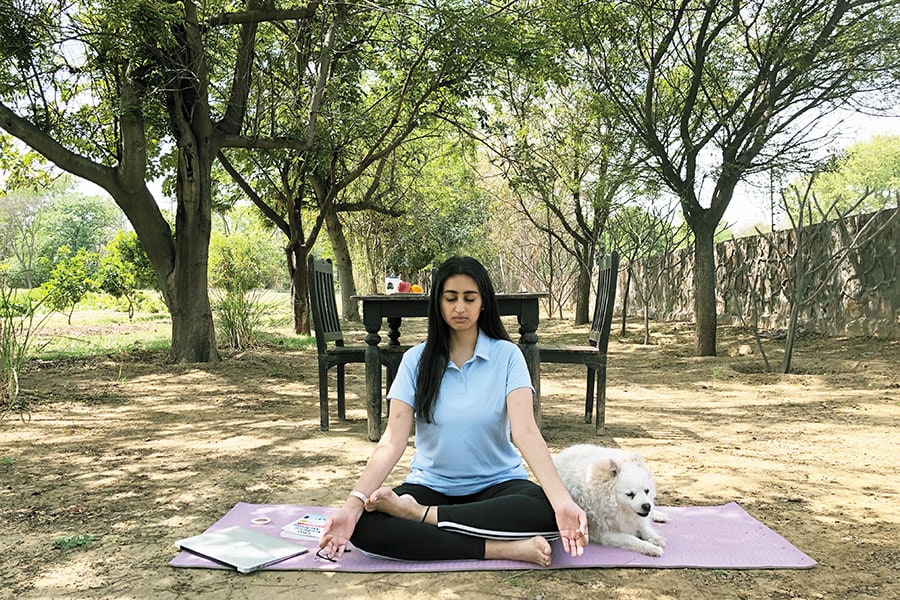 We are doing regular phone calls, webinars and Zoom sessions, but since ours is a business with a corpus of money involved, neither party is comfortable exchanging hands without a face-to-face interaction: Sonali Thapar, director, TCAP Investments
We are doing regular phone calls, webinars and Zoom sessions, but since ours is a business with a corpus of money involved, neither party is comfortable exchanging hands without a face-to-face interaction: Sonali Thapar, director, TCAP Investments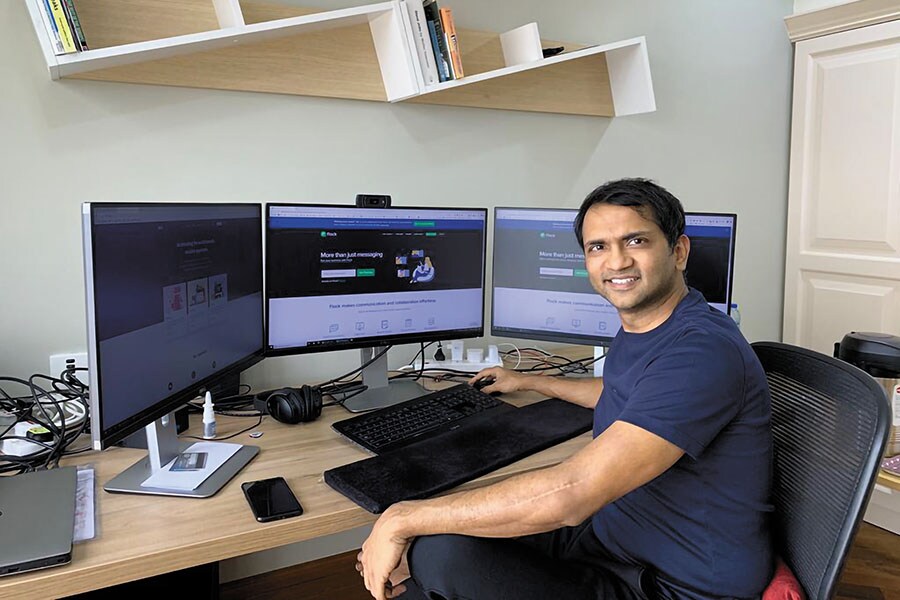 In the remote environment, we don’t want to lose the sense of relationships and the culture either: Bhavin Turakhia, founder-CEO, Flock[br]Even before Prime Minister Narendra Modi declared a complete lockdown from March 25, companies were beginning to see the threat, manifesting first just as extra sanitisation measures around the workplace. In just a few days, as the number of Covid-19 cases rose, many organisations worried that the highly contagious infection could put their employees at risk. When the country-wide shutdown was announced, these companies had to think on their feet, granting access and assets to employees to sign in—and be as productive as possible—without showing up.
In the remote environment, we don’t want to lose the sense of relationships and the culture either: Bhavin Turakhia, founder-CEO, Flock[br]Even before Prime Minister Narendra Modi declared a complete lockdown from March 25, companies were beginning to see the threat, manifesting first just as extra sanitisation measures around the workplace. In just a few days, as the number of Covid-19 cases rose, many organisations worried that the highly contagious infection could put their employees at risk. When the country-wide shutdown was announced, these companies had to think on their feet, granting access and assets to employees to sign in—and be as productive as possible—without showing up. You need to interact with customers in real time to see what’s working and what isn’t: Rohina Anand Khira, owner, AA Living[br]The reality for India, however, is different. “It’s difficult for me to put a number to it, but I would say our readiness as the Indian industry would be close to 5 percent, definitely not more than 10 percent, in terms of the capacity that exists today to support work from home,” says Kiran Bhagwanani, CEO—South Asia of NTT Ltd, a global technology services company that has also been assisting companies in setting up tech infrastructure to make the transition. “It will never become 100 percent—and it’s not meant to be 100 percent—but if we can get to 20 to 30 percent in the long run, that would be positive.”
You need to interact with customers in real time to see what’s working and what isn’t: Rohina Anand Khira, owner, AA Living[br]The reality for India, however, is different. “It’s difficult for me to put a number to it, but I would say our readiness as the Indian industry would be close to 5 percent, definitely not more than 10 percent, in terms of the capacity that exists today to support work from home,” says Kiran Bhagwanani, CEO—South Asia of NTT Ltd, a global technology services company that has also been assisting companies in setting up tech infrastructure to make the transition. “It will never become 100 percent—and it’s not meant to be 100 percent—but if we can get to 20 to 30 percent in the long run, that would be positive.”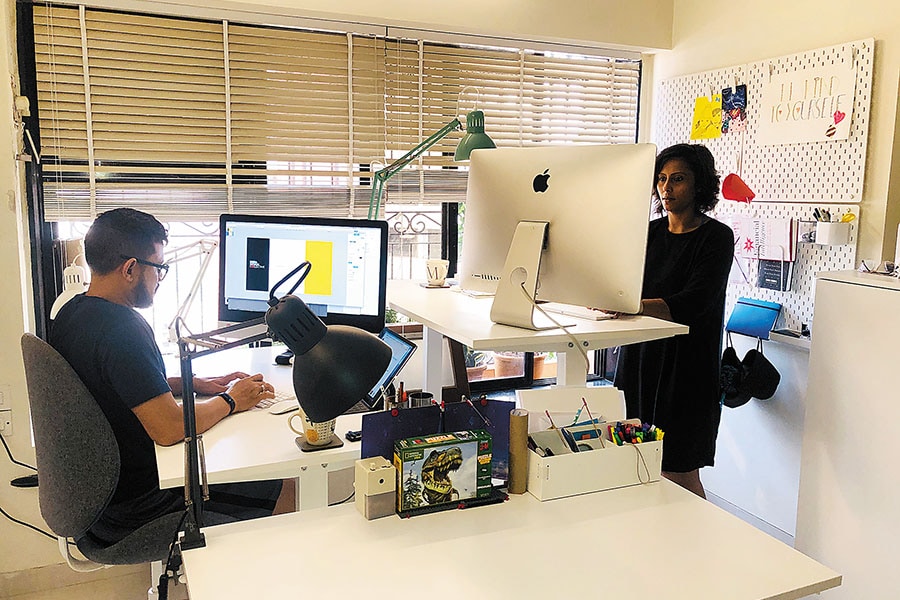 My husband and I have been working from the same space for six years, and with time and mutual respect, we have been able to work and live together. Equality both at work as well as in household chores is essential to keep this balance: Upasana Nattoji Roy, short film maker & designer[br]“Depending on where you are on the privilege ladder, you’re spending two to four hours a day commuting to work, maybe more. Your day begins in a manic rush,” he says. “Now, I can do things at my own pace. In the mornings, I make myself a nice breakfast, listen to a podcast, listen to music or just listen to the stillness of the morning. I start to work by 9.30 am and get solid three hours in before lunch, as I would in an office. Then I work again from 2 pm till evening.”
My husband and I have been working from the same space for six years, and with time and mutual respect, we have been able to work and live together. Equality both at work as well as in household chores is essential to keep this balance: Upasana Nattoji Roy, short film maker & designer[br]“Depending on where you are on the privilege ladder, you’re spending two to four hours a day commuting to work, maybe more. Your day begins in a manic rush,” he says. “Now, I can do things at my own pace. In the mornings, I make myself a nice breakfast, listen to a podcast, listen to music or just listen to the stillness of the morning. I start to work by 9.30 am and get solid three hours in before lunch, as I would in an office. Then I work again from 2 pm till evening.”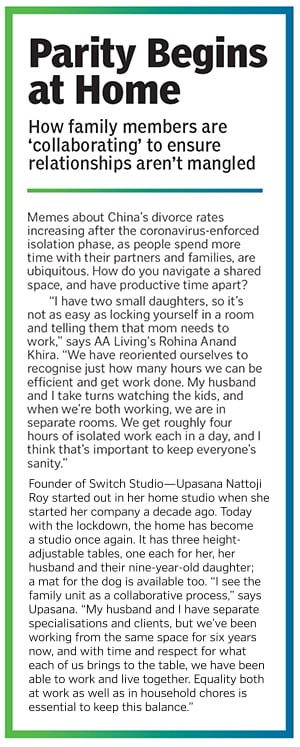 Khursheed says he dedicates certain days of the week to calls and meetings, so he isn’t working in ‘complete isolation’ either. He’s discovered a penchant for cooking and makes himself three meals a day. “From my own experience, I do feel that what we’re witnessing is a fairly critical watershed moment for working from home and a lot of people are very, very quickly going to realise that a lot of non-service jobs that are not location-based can be done from home. And people will make that switch,” he says.
Khursheed says he dedicates certain days of the week to calls and meetings, so he isn’t working in ‘complete isolation’ either. He’s discovered a penchant for cooking and makes himself three meals a day. “From my own experience, I do feel that what we’re witnessing is a fairly critical watershed moment for working from home and a lot of people are very, very quickly going to realise that a lot of non-service jobs that are not location-based can be done from home. And people will make that switch,” he says.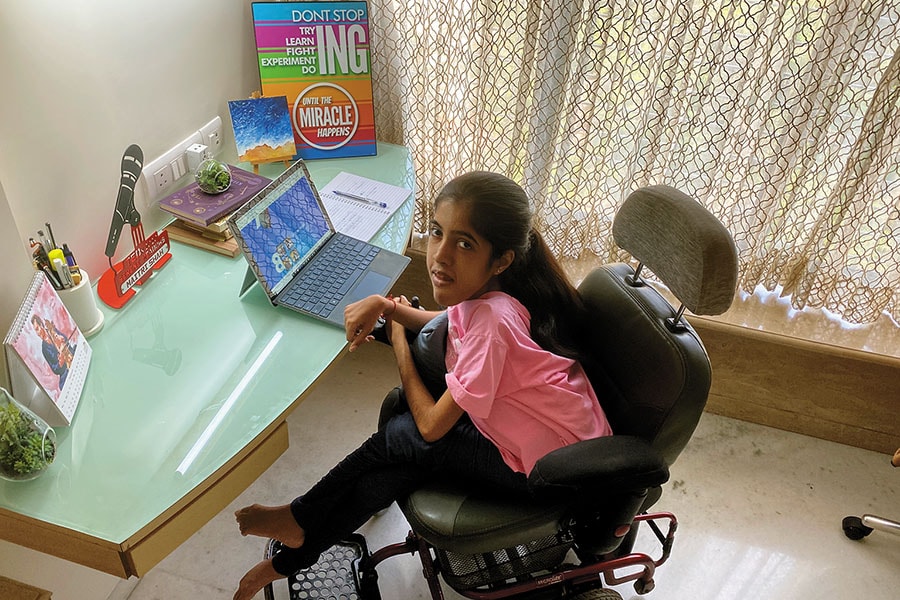 India has 150 million people 27 with disabilities, of which 70 million are employable but 98 percent remains unemployed. That’s a lot of untapped talent: Maitri Shah, founder-CEO , Mind Assets[br]Similarly, Rohina Anand Khira, the Mumbai-based owner of home décor brand AA Living, says that even in the age of ecommerce, solid retail requires physical touchpoints. “You need to interact with customers in real time to see what’s working and what isn’t,” says Khira, who also doubles as a social media influencer. “It could be something as simple as why isn’t there more yellow in the collection—that’s vital customer feedback that people aren’t going to email you for. Being on the shop floor is important. There’s not much I can ask my staff to do from home.”
India has 150 million people 27 with disabilities, of which 70 million are employable but 98 percent remains unemployed. That’s a lot of untapped talent: Maitri Shah, founder-CEO , Mind Assets[br]Similarly, Rohina Anand Khira, the Mumbai-based owner of home décor brand AA Living, says that even in the age of ecommerce, solid retail requires physical touchpoints. “You need to interact with customers in real time to see what’s working and what isn’t,” says Khira, who also doubles as a social media influencer. “It could be something as simple as why isn’t there more yellow in the collection—that’s vital customer feedback that people aren’t going to email you for. Being on the shop floor is important. There’s not much I can ask my staff to do from home.”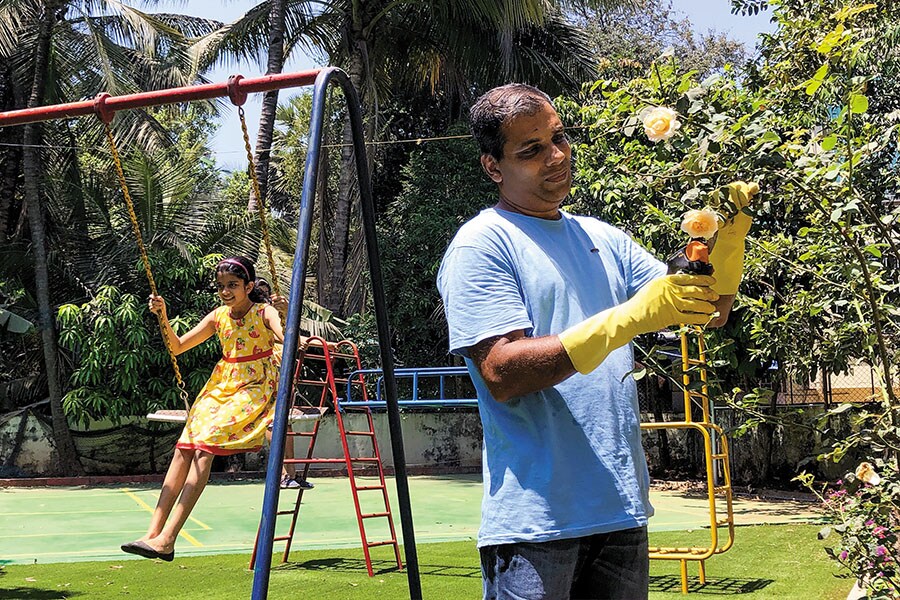 The moment you are not in office, your career path is impacted. But I have no regrets: Jibu Thettayil, solutions architect WITH L&T[br]Ahmedabad-based Amrut Naik, president and head—emerging markets business for pharmaceutical company Zydus Cadila, echoes the sentiment. He typically travels abroad for 120 days in the year. For him, business is significantly impacted as shipments are stranded at various locations with travel restrictions. There isn’t much Naik’s team can accomplish working remotely, but he sees this as bonus quality time with his family, including two sons.
The moment you are not in office, your career path is impacted. But I have no regrets: Jibu Thettayil, solutions architect WITH L&T[br]Ahmedabad-based Amrut Naik, president and head—emerging markets business for pharmaceutical company Zydus Cadila, echoes the sentiment. He typically travels abroad for 120 days in the year. For him, business is significantly impacted as shipments are stranded at various locations with travel restrictions. There isn’t much Naik’s team can accomplish working remotely, but he sees this as bonus quality time with his family, including two sons.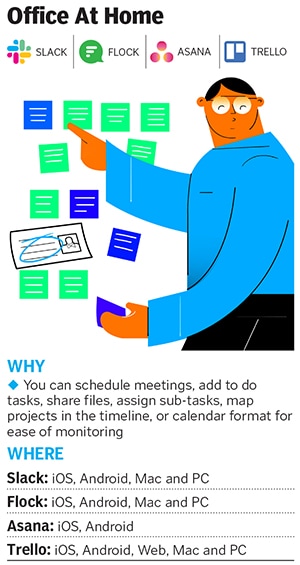 Opening up
Opening up Management roles
Management roles